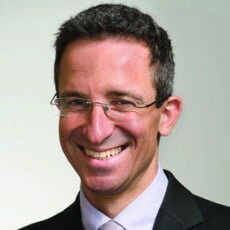by Tal Ben-Shahar
The opposite of love is not hate, it’s indifference. —Elie Wiesel
As we go through life, we encounter dozens of people every day. Each person we meet is a world unto him- or herself. But we pass these people by, and our attitude to them is mostly instrumental: We notice only those aspects that may be of use to us. What would happen if we tried to see each person as a complete human being, rather than as a means to an end? What if we truly tried to get to know people, go beyond the masks and titles and labels, and see them for who they really are? We would notice the beauty within them, appreciate their value—and, as a result, the world would seem to us (and it would actually be) better for it.
Over time, an unintended consequence of learning to truly see others would be that we would begin to see ourselves in a different light as well—as worthy human beings, independent of our instrumental value to others.
For years, I have been lecturing about Marva Collins, the legendary Chicago schoolteacher. I describe the miracles that she performed with at-risk children, helping them realize the great potential that existed within them, potential that so often remains unrecognized, unappreciated, and tragically, ultimately unrealized. Although I admired her from afar for many years, I never initiated a meeting with her, possibly out of shyness. But when I reached forty, my friend C. J. Lonoff thought it was time for me to meet my heroine and role model, even if this meant venturing out of my comfort zone. So as a surprise birthday gift, C. J. organized a lunch with her.
I was in seventh heaven! C. J. and I sat in a restaurant for three hours with Marva Collins and her husband, George, and during that time I felt I was privileged to be in the presence of greatness. Marva Collins has the gift of breathing life and energy into every person she comes in contact with. When we sat down at the table, our waiter appeared lethargic and emotionally not present. All it took was a few words from Mrs. Collins—a few smiles, a question or two about his background and his goals in life—and his energy and self-confidence visibly increased. And when his shift was over and a new waitress took over, she, too, received the same treatment. Mrs. Collins’s interest in people is genuine, and when she interacts with others, she wants to get to know and to enjoy the company of each person.
She is that way with everyone she meets for the first time, as well as with her husband of many years, her friends and acquaintances, and of course her students. She sees them, accepts them without preconceptions, and brings out the best in them. If one of the children she is teaching gets upset with her, for being too demanding or not letting them slack off, and vents their frustration by saying something like, “I hate you, Mrs. Collins,” her response is, “That’s okay, sweetheart, I love you enough for the both of us.”
Look, really look, at the people around you. Can you see your friends for who they are? Are you able to truly see the value and worth of the people you meet every day?
Dr. Tal Ben-Shahar, Co-founder of WholeBeing Institute, is an author and lecturer who taught the largest course at Harvard on “Positive Psychology” and the third largest on “The Psychology of Leadership”—with a total of over 1,400 students. Author of Happier: Learn the Secrets to Daily Joy and Lasting Fulfillment, he consults and lectures around the world to corporate executives, the general public, and at-risk populations on topics that include happiness, self-esteem, resilience, goal setting, mindfulness, and leadership. He holds a doctorate in organizational behavior and a bachelor’s degree in philosophy and psychology from Harvard.


 Dr. Tal Ben-Shahar, Co-founder of WholeBeing Institute, is an author and lecturer who taught the largest course at Harvard on “Positive Psychology” and the third largest on “The Psychology of Leadership”—with a total of over 1,400 students. Author of Happier: Learn the Secrets to Daily Joy and Lasting Fulfillment, he consults and lectures around the world to corporate executives, the general public, and at-risk populations on topics that include happiness, self-esteem, resilience, goal setting, mindfulness, and leadership. He holds a doctorate in organizational behavior and a bachelor’s degree in philosophy and psychology from Harvard.
Dr. Tal Ben-Shahar, Co-founder of WholeBeing Institute, is an author and lecturer who taught the largest course at Harvard on “Positive Psychology” and the third largest on “The Psychology of Leadership”—with a total of over 1,400 students. Author of Happier: Learn the Secrets to Daily Joy and Lasting Fulfillment, he consults and lectures around the world to corporate executives, the general public, and at-risk populations on topics that include happiness, self-esteem, resilience, goal setting, mindfulness, and leadership. He holds a doctorate in organizational behavior and a bachelor’s degree in philosophy and psychology from Harvard.






